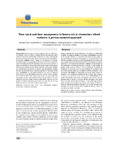Time spent and time management in homework in elementary school students : a person-centered approach

Use este enlace para citar
http://hdl.handle.net/2183/35073Coleccións
- Investigación (FEDU) [938]
Metadatos
Mostrar o rexistro completo do ítemTítulo
Time spent and time management in homework in elementary school students : a person-centered approachTítulo(s) alternativo(s)
Tiempo y gestión del tiempo dedicado a los deberes en Educación Primaria : un enfoque centrado en la personaAutor(es)
Data
2019Cita bibliográfica
Arias, A. V., Aguín, I. P., Martínez, S. R., Fernández, B. R., Rodríguez, C. F., & Rosário, P. (2019). Time spent and time management in homework in elementary school students. Psicothema, 31(4), 422-428.
Resumo
[Abstract] Background: Based on a person-centered approach, the aim ofthis study is to identify different profi les of students based on the time they spend on homework and the use they make of that time; as well as analyzing the differences between them in the amount of homework done and academic achievement. Method: With a sample of 968 students of Primary Education analysis of latent profi les (LPA) and ANOVA were carried out. Once the student profi les were identifi ed, a MANOVA was conducted to analyze the differences between the motivational profi les in the amount of homework assignments done and in academic achievement. Results: We differentiated four profi les of students that differentially combine the time they dedicate to their homework and the use they make of that time. Conclusions: Of the profi les identifi ed, two can be considered more effective (those that manage time better), and two can be classifi ed as less effective (those that manage time worse). The two profi les that best manage the time spent on homework are also those that do the most homework, and have higher academic achievement. Likewise, the two profi les of students who manage time worst are those who do the least homework, and who have lower academic achievement. [Resumen] Antecedentes: partiendo de un enfoque centrado en la persona, el propósito de este trabajo es identifi car diferentes perfi les de estudiantes en función del tiempo que dedican a los deberes escolares y de la gestión que hacen de ese tiempo; así como también analizar las diferencias entre ellos en la cantidad de deberes realizados y en el rendimiento académico. Método: con una muestra de 968 estudiantes de Educación Primaria, se llevaron a cabo análisis de perfi les latentes (LPA) y ANOVA. Una vez identifi cados los perfi les de estudiantes se realizó un MANOVA para analizar las diferencias entre los perfi les motivacionales en la cantidad de deberes realizados y en el rendimiento. Resultados: se han podido diferenciar cuatro perfi les de estudiantes que combinan de manera distinta el tiempo que dedican a los deberes y la gestión que hacen de ese tiempo. Conclusiones: de los perfi les identifi cados, dos pueden considerarse más efi caces (los que gestionan mejor el tiempo) y otros dos pueden catalogarse como menos efi caces (los que gestionan peor el tiempo). Los dos perfi les que gestionan mejor el tiempo son también los que realizan más cantidad de deberes y tienen un rendimiento académico más alto; y los dos que gestionan peor el tiempo son los que realizan menos cantidad de deberes y tienen un rendimiento académico más bajo.
Palabras chave
Homework
Time spent
Time management
Academic achievement
Elementary education
Deberes escolares
Tiempo dedicado
Gestión del tiempo
Rendimiento académico
Educación primaria
Time spent
Time management
Academic achievement
Elementary education
Deberes escolares
Tiempo dedicado
Gestión del tiempo
Rendimiento académico
Educación primaria
Versión do editor
Dereitos
Psicothema es una revista de acceso abierto [...]. Los usuarios pueden leer, descargar, copiar, distribuir, imprimir, buscar, o realizar enlaces a los textos completos de esta revista sin pedir permiso previo al editor o al autor, siempre y cuando la fuente original sea referenciada.
ISSN
0214 - 9915





